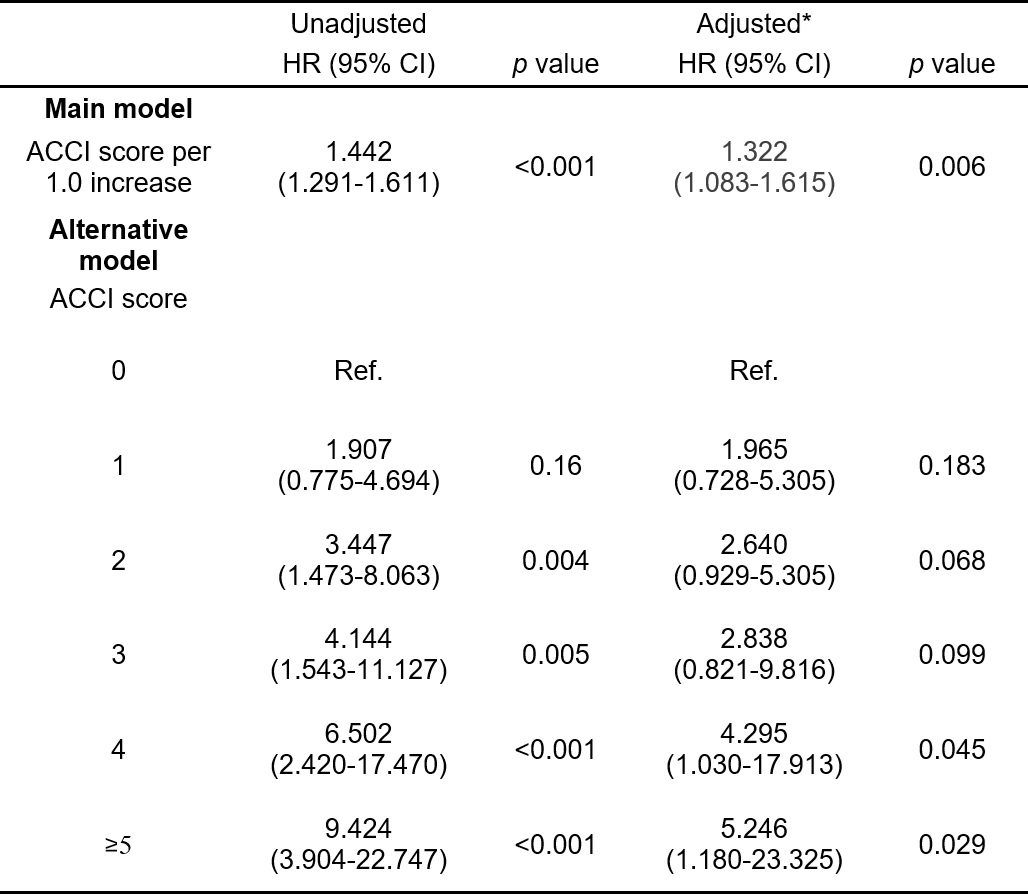Session Information
Date: Tuesday, October 28, 2025
Title: (2377–2436) Systemic Lupus Erythematosus – Diagnosis, Manifestations, & Outcomes Poster III
Session Type: Poster Session C
Session Time: 10:30AM-12:30PM
Background/Purpose: The CCI has been associated with adverse health-related outcomes in SLE-patients worldwide. Its modified version, the age-adjusted CCI (ACCI) has been associated with organ damage and mortality in Korean and Taiwanese SLE-patients cohorts. However, there are no studies addressing the impact of ACCI in mortality in Latin-American SLE cohorts. The aim of this study was to evaluate the ACCI as a predictor of mortality in Latin-American patients with SLE.
Methods: A secondary analysis was performed on the data from the Almenara Lupus Cohort. The follow-up period assessed was from January 2012 to March 2025. To enter this cohort, patients had to meet the ACR 1997 or the SLICC 2012 criteria set and to be older than 18 years of age at the baseline visit. Patients who had been diagnosed with other autoimmune disease, except Sjögren’s or the antiphospholipid syndromes were excluded. Mortality was determined as the vital status according to the official information from the Peruvian Department of Health. ACCI scores were used to measure comorbidity status, excluding the point for connective tissue disease. It was calculated at baseline as a continuous variable. Unadjusted and adjusted Cox regression models were performed to assess the impact of ACCI on mortality. The model was adjusted for age at diagnosis, gender, ethnic group, socioeconomic status, years of education, tobacco use, disease duration, the SLEDAI-2K, the SLICC/ACR damage index, the prednisone daily dose, antimalarial and immunosuppressive drugs use and the number of prescribed drugs. In an alternative model, the ACCI was categorized as 0,1,2,3,4 and ≥ 5.
Results: Five-hundred and nine patients were included, 470 (92.3%) were women, their mean (SD) age at diagnosis was 35.0 (14.0) years, their disease duration at baseline was 6.7 (6.1) years, their mean (SD) ACCI was 1.4 (1.7) and their mean follow-up time was 8.5 (4.1) years. Fifty-seven (11.2%) patients died during the follow-up. A higher ACCI predicted mortality in both, the unadjusted [HR=1.442, (95% CI: 1.291-1.611; p≤0.001)] and adjusted analyses [HR=1.322, (95% CI: 1.083-1.615); p=0.006]. Main and alternative models are depicted in Table 1.
Conclusion: Higher ACCI scores predicted mortality after adjusting for potential confounders in a Latin-American SLE cohort. The active evaluation of comorbidities and their proper management will result in SLE patients having a better survival.
 Table 1. Impact of the ACCI on mortality in SLE patients.
Table 1. Impact of the ACCI on mortality in SLE patients.
*Adjusted for age at diagnosis, gender, ethnic group, socioeconomic status, years of education, tobacco use, disease duration, SLEDAI-2K, SLICC/ACR damage index, prednisone daily dose, antimalarial and immunosuppressive drugs use and the number of prescribed drugs.
ACCI: Age-adjusted Charlson Comorbidity Index; HR: Hazard Ratio
To cite this abstract in AMA style:
Rashuamán-Conche B, Gamboa-Cárdenas R, Pimentel-Quiroz V, Reategui-Sokolova C, Elera-Fitzcarrald C, Pastor-Asurza C, Rodriguez-Bellido Z, Perich-Campos R, Alarcón G, Ugarte-Gil M. The Age-Adjusted Charlson Comorbidity Index (CCI) Predicts All-Cause Mortality in Systemic Lupus Erythematosus (SLE) Patients: Data from the Almenara Lupus Cohort [abstract]. Arthritis Rheumatol. 2025; 77 (suppl 9). https://acrabstracts.org/abstract/the-age-adjusted-charlson-comorbidity-index-cci-predicts-all-cause-mortality-in-systemic-lupus-erythematosus-sle-patients-data-from-the-almenara-lupus-cohort/. Accessed .« Back to ACR Convergence 2025
ACR Meeting Abstracts - https://acrabstracts.org/abstract/the-age-adjusted-charlson-comorbidity-index-cci-predicts-all-cause-mortality-in-systemic-lupus-erythematosus-sle-patients-data-from-the-almenara-lupus-cohort/
